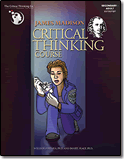James Madison Critical Thinking Course
Captivating Crime-Related Scenarios
Grades: 10-12+
Critical Thinking, Test Prep & Tests

Full curriculum
Grades: 10-12+
Critical Thinking, Test Prep & Tests

Full curriculum
- Multiple Award Winner
Components Sold Separately
James Madison Critical Thinking Course
Description and Features
Description and Features
Description and Features
This comprehensive 544-page critical thinking course engages students in captivating crime-solving related scenarios to develop essential critical thinking skills. The step-by-step lessons and activities are easy-to-use and help students transfer these vital skills throughout academia and life. The course can be used with sharp students beginning in 8th grade, above average high school students, and adults.
The course teaches more than 65 critical thinking related skills and concepts that will improve academic performance across the curriculum:
- Interpret and apply complex texts, instructions, illustrations, etc.
- Recognize and clarify issues, claims, arguments, and explanations
- Distinguish: conclusions, premises (reasons), arguments, explanations, assumptions (stated/unstated), issues, claims (statements), suppositions, unstated conclusions, unstated premises and implications
- Recognize ambiguity and unclearness in claims, arguments, and explanations
- Distinguish necessary and sufficient conditions
- Describe the structure or outline of arguments and explanations: confirmation, disconfirmation
- Evaluate whether an inductive argument is strong or weak
- Evaluate claims and arguments in terms of criteria such as: consistency, relevance, support
- Evaluate analogical arguments and inductive generalization arguments in terms of criteria, such as: the greater the number of similarities between the conclusion and the premises regarding the sample, the stronger the argument
- Assess the relevance of claims to other claims, and to questions, descriptions, representations, procedures, information, directives, rules, principles, etc.
- Evaluate whether a deductive argument is valid or invalid (logical form): categorical, truth-functional, and semantic/definitional
- Distinguish supporting, conflicting, compatible, and equivalent claims, arguments, explanations, descriptions, representations, etc.
- Identify and avoid errors in reasoning, informal fallacies: begging the question, equivocation, post hoc, ergo propter hoc (after that, therefore, because of that), false dilemma/false dichotomy fallacy (line drawing fallacy, perfectionist fallacy), smoke screen/red herring/rationalizing, hasty generalization, appeal to ridicule/sarcasm, ad hominem fallacy (personal attack, poisoning the well), appeal to illegitimate authority, loaded question, evidence surrogate, stereotyping , appeal to consequences (favorable or unfavorable), "wishful thinking", genetic fallacy, biased generalization, anecdotal evidence
- Discern whether pairs of claims are consistent, contrary, contradictory, or paradoxical
Teaching Support
The 102-page Answer Guide (required, sold separately) includes teaching suggestions and answers. No previous background in logic is required to teach these activities.
Note: The James Madison Test of Critical Thinking Forms A and B provide a direct assessment of skills covered in this book (contact us for licensing).
Product Details
| Item#: | 05705PBP |
| Author(s): | William O'Meara, Ph.D. and Daniel Flage, Ph.D. |
| TOC: | View Table of Contents |
| Subject: | Critical Thinking, Test Prep & Tests |
| Type: | Student Book |
| Media: | Paperback Book |
| License: | Reproducible |
| ISBN–10: | 1-60144-145-2 |
| ISBN–13: | 978-1-60144-145-4 |
| Pages: | 544, perforated |
Awards
Practical Homeschooling Magazine - Reader Awards, 2015 - Honorable Mention, Logic
Customer Reviews
recommend this product





 View Sample Pages
View Sample Pages
